The 51st Session of the Human Rights Council
12 September – 7 October 2022
Agenda Item 3 – Promotion and protection of all human rights, civil, political, economic, social, and cultural rights, including the right to development
Interactive Dialogue with the Special Rapporteur on the promotion of Truth, Justice, Reparation, and Guarantees of Non-recurrence
16th September 2022
By Emily Bare / GICJ
Executive Summary
Transitional justice is the process whereby judiciary and non-judiciary measures are taken to ensure a peaceful transition conducive to reconciliation following a period of social conflict.
The report of the Special Rapporteur on the promotion of truth, justice, reparations, and guarantees of non-recurrence focused on the role and responsibilities of non-State actors in transitional justice processes. The report highlights that non-State actors should play a central role in transitional justice processes and should be engaged from the early stages of conflict resolution. Additionally, non-State actors should support the investigation and prosecution of perpetrators of human rights violations and work to ensure that victims have access to justice and reparations. The report also recommends that States ensure that non-State actors have the capacity and resources necessary to fulfil their responsibilities in transitional justice processes and take steps to protect these actors from intimidation or retaliation.
On the 16th of September of 2022, the Special Rapporteur, Mr. Fábian Salvioli, took the floor and presented his report to the stakeholders opening an interactive dialogue under item 3 of the agenda. In his opening statement, he reiterated several of the points made in the report. He addressed the obligations of truth, justice, and reparation regarding corporations and armed non-State actors specifically. He also discussed his country visits to Croatia and Bosnia and Herzegovina. The general attitude of the intervening delegations was one of commitment to transitional justice, providing special attention to capacity building and transitional justice mechanisms. The centrality of victims during the process was a recurrent theme, as was the need to take a holistic approach that considers all aspects and is inclusive of all parties involved.
GICJ welcomes Mr. Salvioli’s insistence on including memory as the fifth pillar of transitional justice, an element that has been historically overlooked in processes across the world. We underscore the urgency of adopting an inclusive victim-centred approach to ensure reconciliation.
Background
There has been gradual growth toward the recognition of victims to armed conflict and of the need to provide reparations for the harm they have endured. Under international law, the duty to repair is one of the legal consequences which arises from an international actor’s wrongful act. This duty upon wrongdoers to provide reparations has been recognised as an important justice and accountability measure for victims of armed conflict.
Non-State armed groups are presently one of the main actors in conflict and have the capacity to cause significant harm in societies where they operate. Different types of non-State actors have historically been responsible for serious violations of human rights and humanitarian law, which may be considered within the purview of transitional justice. These non-State actors may include corporations or private organisations, non-State armed groups and other civil society organisations, or even criminal gangs.
In resolution A/HRC/RES/45/10, the Human Rights Council acknowledged the critical work of the Special Rapporteur on truth, justice, reparation, and guarantees of non-occurrence in investigating these serious violations of human rights. Thus, the Council decided to extend the mandate of the Special Rapporteur for a period of three years. The resolution acknowledged that the fight against impunity and the implementation of transitional justice processes can prevent the recurrence of gross violations of human rights and international humanitarian law.
This resolution by the Human Rights Council allows the Special Rapporteur on truth, justice, reparation, and guarantees of non-occurrence, Fábian Salvioli, to continue his work on producing thematic reports and undertaking country visits.
Report of the Special Rapporteur on Truth, Justice, and Reparation
The Special Rapporteur on truth, justice, reparation, and guarantees of non-recurrence, Fábian Salvioli, released a report on the 12th of July 2022 that discusses the role and responsibilities of non-State actors in transitional justice processes (A/HRC/51/34). He reviews progress made by States in implementing transitional justice measures, as well as non-State actors' progress in promoting these measures. Notably, Mr. Salvioli focuses on non-State armed groups and corporations. The report highlights that non-State actors play an essential role in supporting and advancing the implementation of transitional justice measures and outlines several key responsibilities for non-State actors in this regard. First, the report highlights that non-State actors should play a central role in transitional justice processes and should be engaged from the early stages of conflict resolution. Second, non-State actors should support the investigation and prosecution of perpetrators of human rights violations and should work to ensure that victims can access justice and receive reparations.
The report also recommends that States ensure that non-State actors have the capacity and resources necessary to fulfil their responsibilities in transitional justice processes and take steps to protect these actors from intimidation or retaliation. To support the effective application of transitional justice measures, States should also implement policies and programs to promote truth-telling and reconciliation among all stakeholders. The Special Rapporteur notes that transitional justice processes are essential for restoring victims, perpetrators, and the general public’s sense of trust in the justice system. However, he warns that transitional justice measures can be undermined if non-State actors are not given the resources and capacity needed to fulfil their responsibilities.
Mr. Salvioli argues that State and international actors should have relevant legal frameworks that support the implementation of transitional justice measures. These frameworks should include provisions for the identification and punishment of those responsible for human rights violations, as well as mechanisms for rehabilitating and reintegrating former perpetrators into society. Furthermore, he urges States to ensure that all victims can participate in transitional justice processes, irrespective of their legal status or location. Mr. Salvioli is also concerned about the accountability of some States involved in transitional justice settings. For instance, he finds that perpetrators of serious crimes have been granted non-custodial alternatives, yet they have been involved in serious human rights violations. He calls on States to take steps to prosecute these actors of abuse by establishing mechanisms for the reporting and investigation of such incidents and ensuring victims get justice.
In most cases, States and non-State actors fail to take victims' needs into account or offer them the attention required. The report highlights this by stating that transitional justice mechanisms must address the different experiences of victims and allow their stories to be heard and ensure perpetrators are held accountable. This must be done while acknowledging the complexity around how such accountability is achieved. For example, when recounting a past trauma or violence it should not lead to a repeat of that experience or violence in other areas of life or lead to an increased fear for one’s personal safety.
There are several recommendations provided in the report. For instance, States are encouraged to develop accountability frameworks that support effective implementation of transitional justice measures. In addition, States should take steps to protect non-State actors involved in transitional justice processes from intimidation or retaliation and ensure that all victims can participate in transitional justice processes, thus securing their justice. On the issue of corporations, the report recommends that every individual perpetrator and civil litigator should be held accountable for any crime or abuse committed by following a legal prosecution process; thus, avoiding legal immunity. On gender-sensitivity, the report recommends that a gender-sensitive approach should be given to both transitional justice in general and individual transitional justice. The recommendation is that the victims have their dignity restored and their reparations valued. Also, gender should be considered in all stages of the transitional justice while looking at past abuses and making sure that discrimination is eradicated.
The report is a valuable resource for policymakers and practitioners interested in understanding the role and responsibilities of non-State actors in transitional justice processes. It provides an overview of the key aspects of this role and highlights the importance of ensuring that these actors have the capacity and resources needed to fulfil their responsibilities. This information can help to ensure that transitional justice measures are effective and fair, and that victims are able to receive redress for their violations. The report’s recommendations offer a great opportunity for State and non-State actors to address injustices and promote transitional justice.
Interactive Dialogue on the Special Rapporteur's Report
 On the 16th of September, during the 51st session of the Human Rights Council, the Special Rapporteur on the promotion of truth, justice, reparation and guarantees of non-recurrence, Mr. Fábian Salvioli, presented his report on the role of non-State actors during transitional justice processes. Although non-State actors are a wide-ranging group of actors, Mr. Salvioli focused mainly on corporations and non-State armed groups.
On the 16th of September, during the 51st session of the Human Rights Council, the Special Rapporteur on the promotion of truth, justice, reparation and guarantees of non-recurrence, Mr. Fábian Salvioli, presented his report on the role of non-State actors during transitional justice processes. Although non-State actors are a wide-ranging group of actors, Mr. Salvioli focused mainly on corporations and non-State armed groups.
In reference to companies, he stated that transitional justice procedures must provide the legal facilities and resources to help companies participate in the process of seeking truth, justice, reparation, and guarantees of non-recurrence for victims. He affirmed that companies must be held accountable for their actions. In doing so, he urged for criminal prosecutions to induce responsibility of companies as well as civil cases brought against individual actors of companies to bring about justice.
While discussing non-State armed groups, Mr. Salvioli stated that these groups have a legal and moral obligation to cooperate in truth-seeking initiatives. He explained that truth commissions are the appropriate mechanism to investigate these actors' violations, as they can establish general patterns that help to facilitate these violations and may uncover collusion behind the States and the non-State actors. He stressed that non-State armed groups are responsible for the actions of their members and must be prosecuted accordingly. In doing so, he discussed the use of trials in assigning responsibility for systematic violations by stating that although restorative justice is useful, it cannot substitute criminal prosecutions when finding justice for victims.
Further, Mr. Salvioli discussed his country visits to the States concerned - Croatia and Bosnia and Herzegovina.
 Regarding Croatia, he welcomed the efforts that have been made since the war to respond to the abuses of the past, especially in seeking out missing persons, the criminal prosecution of war criminals, and the institutional and legal reforms of the rule of law. However, he recognised the country's stagnation in its transitional processes over recent years. He stressed that victims of sexual violence must be able to seek truth and the State must collect data aimed at preventing the recurrence of such crimes in the future.
Regarding Croatia, he welcomed the efforts that have been made since the war to respond to the abuses of the past, especially in seeking out missing persons, the criminal prosecution of war criminals, and the institutional and legal reforms of the rule of law. However, he recognised the country's stagnation in its transitional processes over recent years. He stressed that victims of sexual violence must be able to seek truth and the State must collect data aimed at preventing the recurrence of such crimes in the future.
 When discussing Bosnia and Herzegovina, Mr. Salvioli commended the efforts made toward finding missing persons, the prosecution of war criminals, and institutional reforms. However, he highlighted the insufficient level of reparation means and resources within the country. He explained a decline in the interethnic environment through his examination of inflammatory stances being taken by nationalist elites and the exploitation of interethnic conflicts to obtain political gain. He examined an increase in hate speech and denial of crimes committed against ethnic groups. In turn, this deterioration of the interethnic environment created a more volatile political and social life for individuals in the State. Mr. Salvioli strongly urged the international community to diligently act to avoid repetition of the past.
When discussing Bosnia and Herzegovina, Mr. Salvioli commended the efforts made toward finding missing persons, the prosecution of war criminals, and institutional reforms. However, he highlighted the insufficient level of reparation means and resources within the country. He explained a decline in the interethnic environment through his examination of inflammatory stances being taken by nationalist elites and the exploitation of interethnic conflicts to obtain political gain. He examined an increase in hate speech and denial of crimes committed against ethnic groups. In turn, this deterioration of the interethnic environment created a more volatile political and social life for individuals in the State. Mr. Salvioli strongly urged the international community to diligently act to avoid repetition of the past.
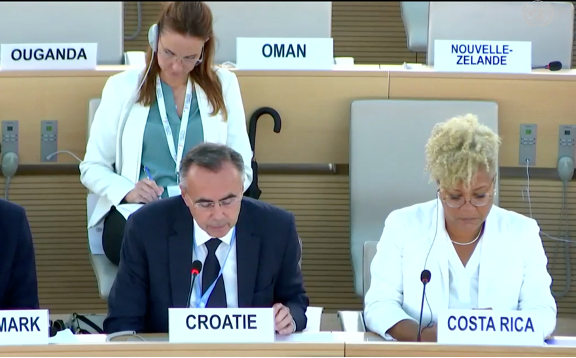 In response, the representative of Croatia welcomed the report's recognition of the State’s significant progress in certain areas, particularly the creation of a legal framework for missing persons and war crimes. He stated that, despite the atrocities committed during the State's conflict with Serbia, reconciliation between these communities has been established. He highlighted the discovery of 150 mass graves that contained the remains of many missing individuals, with many of them finally being identified, as well as the State's commitment toward identifying the remaining 1,832 missing persons. He explained that Croatia paved the way toward comprehensive transitional justice and is committed to ensuring transitional justice processes. However, he highlighted the lack of political will from Serbia in turning over archives and information to help further the identification of missing persons from the homeland war, urging immediate attention and action.
In response, the representative of Croatia welcomed the report's recognition of the State’s significant progress in certain areas, particularly the creation of a legal framework for missing persons and war crimes. He stated that, despite the atrocities committed during the State's conflict with Serbia, reconciliation between these communities has been established. He highlighted the discovery of 150 mass graves that contained the remains of many missing individuals, with many of them finally being identified, as well as the State's commitment toward identifying the remaining 1,832 missing persons. He explained that Croatia paved the way toward comprehensive transitional justice and is committed to ensuring transitional justice processes. However, he highlighted the lack of political will from Serbia in turning over archives and information to help further the identification of missing persons from the homeland war, urging immediate attention and action.
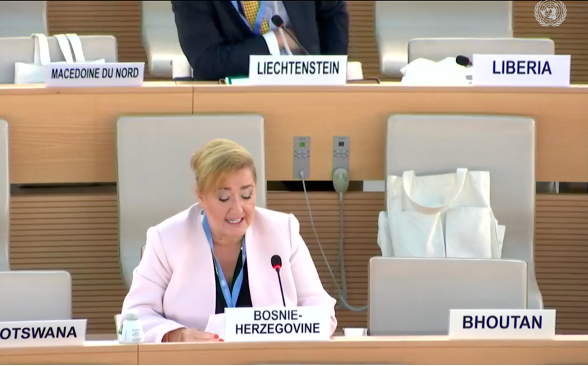 The representative of Bosnia and Herzegovina addressed the positive steps the State has taken regarding truth, justice, and reparation as well as its challenges. She explained that the State will strongly use the recommendations of the Special Rapporteur and work to implement the recommendations into domestic policies and law. She highlighted the States' commitment to all human rights, including a person's right to truth seeking. Although the State will work to uphold these obligations, she stated that the support of the international community is still very much needed.
The representative of Bosnia and Herzegovina addressed the positive steps the State has taken regarding truth, justice, and reparation as well as its challenges. She explained that the State will strongly use the recommendations of the Special Rapporteur and work to implement the recommendations into domestic policies and law. She highlighted the States' commitment to all human rights, including a person's right to truth seeking. Although the State will work to uphold these obligations, she stated that the support of the international community is still very much needed.
Delegations were then given the floor to ask questions of the Special Rapporteur and his report.
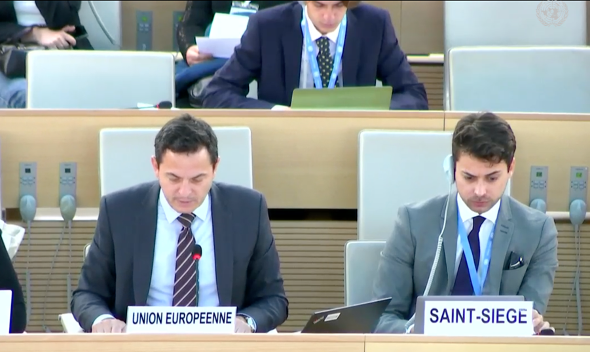 The European Union delegate addressed the fact that Mr. Salvioli's report provides good practical recommendations for all States. He emphasised the European Union's continued support of the mandate of the Special Rapporteur. He expressed that transitional justice involving State and non-State actors remains a priority in the European Union action plan on Human Rights and Democracy for 2020-2024. In practice, he highlighted the European Union's cooperation with many partner countries in the year 2021. He concluded by explaining how the report places international humanitarian law, human rights standards, and criminal law at the core of the transitional justice legal framework. He posed the following question to the Special Rapporteur: What role do you see for the Human Rights Council in this regard?
The European Union delegate addressed the fact that Mr. Salvioli's report provides good practical recommendations for all States. He emphasised the European Union's continued support of the mandate of the Special Rapporteur. He expressed that transitional justice involving State and non-State actors remains a priority in the European Union action plan on Human Rights and Democracy for 2020-2024. In practice, he highlighted the European Union's cooperation with many partner countries in the year 2021. He concluded by explaining how the report places international humanitarian law, human rights standards, and criminal law at the core of the transitional justice legal framework. He posed the following question to the Special Rapporteur: What role do you see for the Human Rights Council in this regard?
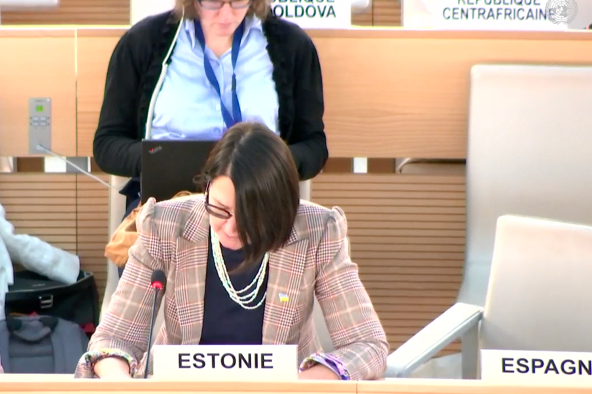 The Estonian delegate, on behalf of the Nordic-Baltic countries, concurred in the findings of the report that international humanitarian law, international human rights standards, and international criminal law are all applicable to non-State armed groups. She explained that in addition to individual accountability, non-State armed groups should be held collectively responsible for serious breaches of humanitarian or human rights law. Further, she highlighted that blanket amnesties for these breaches are unacceptable and endorses a culture of impunity. She urged all transitional justice processes to be victim-centred and gender transformative. In her concluding remarks, she posed the following questions to the Special Rapporteur: What advice can you provide to governments on how to better ensure victims' rights to the transitional justice processes including through positive engagement? How can States better mediate dialogue between victims and non-State armed groups?
The Estonian delegate, on behalf of the Nordic-Baltic countries, concurred in the findings of the report that international humanitarian law, international human rights standards, and international criminal law are all applicable to non-State armed groups. She explained that in addition to individual accountability, non-State armed groups should be held collectively responsible for serious breaches of humanitarian or human rights law. Further, she highlighted that blanket amnesties for these breaches are unacceptable and endorses a culture of impunity. She urged all transitional justice processes to be victim-centred and gender transformative. In her concluding remarks, she posed the following questions to the Special Rapporteur: What advice can you provide to governments on how to better ensure victims' rights to the transitional justice processes including through positive engagement? How can States better mediate dialogue between victims and non-State armed groups?
 The delegate of the Organization of American States expressed that international humanitarian law, human rights, and international criminal law have been central themes in the work of the Organization of American States since its establishment in 1959. She stated that the Inter-American system has repeatedly said that impunity for crimes of this serious nature is intolerable and holds that States must make specific efforts to remove the obstacles preventing establishment of the truth.
The delegate of the Organization of American States expressed that international humanitarian law, human rights, and international criminal law have been central themes in the work of the Organization of American States since its establishment in 1959. She stated that the Inter-American system has repeatedly said that impunity for crimes of this serious nature is intolerable and holds that States must make specific efforts to remove the obstacles preventing establishment of the truth.
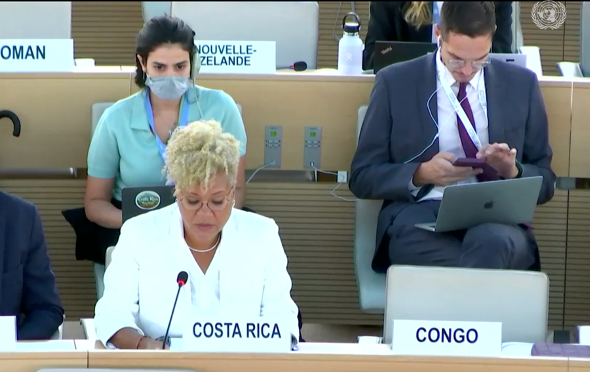 The delegate of Costa Rica, on behalf of members of the Group of Friends of the Responsibility to Protect, stated that anyone connected and complicit to atrocity crimes should be held accountable as appropriate. In her concluding remarks, she posed the following question to the Special Rapporteur: How can the UN human rights system include in its mechanisms and procedures strengthening measures to ensure that relevant actors adhere to their obligations under international law and contribute to transitional justice processes?
The delegate of Costa Rica, on behalf of members of the Group of Friends of the Responsibility to Protect, stated that anyone connected and complicit to atrocity crimes should be held accountable as appropriate. In her concluding remarks, she posed the following question to the Special Rapporteur: How can the UN human rights system include in its mechanisms and procedures strengthening measures to ensure that relevant actors adhere to their obligations under international law and contribute to transitional justice processes?
The floor was then given to civil society organisations to express their concerns regarding the Special Rapporteur's report. Several NGOs and civil society organisations were involved in this discussion. Representatives stated that there has been a weakening of human rights institutions and rule of law worldwide. They furthered this sentiment by acknowledging that widespread impunity is unsustainable and intolerable. Representatives explained that the lack of political will by States to remove obstacles in accessing human rights should be a major concern. Speakers urged member States to hold perpetrators accountable for atrocities and recognise these crimes as crimes against humanity. Civil society organisations concluded their statements by urging States to implement the Special Rapporteur's recommendations and increase their efforts toward promoting truth, justice, and reparation.
Concluding Remarks
The Special Rapporteur, Mr. Salvioli, concluded by thanking the delegates for their various perspectives and opinions during the interactive dialogue. He commented on the two country reports from Croatia and Bosnia and Herzegovina. He stated that he would like to work further with Bosnia and Herzegovina to ensure lasting peace within the country. In response to Croatia, he affirmed that his report was accurate, and that the additional information submitted to him by the State does not change the report's accuracy.
Mr. Salvioli provided general comments on the report and highlighted that transitional justice must conform to the five pillars; that without one of the five pillars, transitional justice will fail. He explained that the five pillars are: truth, accountability, reparations, institutional reform, and memorialisation. He also stated that universal jurisdiction is essential to ensure that States can conduct procedures for the most serious of crimes.
The Special Rapporteur concluded by thanking the parties involved in the development of his report and requested that those countries that received a request for a visit to accept that visit to help further this work in the future.
Position of Geneva International Centre for Justice
GICJ welcomes the report and commends the Special Rapporteur for fulfilling his duties. We would also like to extend our appreciation to the HRC members who manifested their commitment to transitional justice in the duration of the Interactive Dialogue. Nonetheless, we remain concerned about those countries shielding behind national legal provisions and national sovereignty to justify the lack of measures of transitional justice taken that ultimately lead to de facto impunity.
We call for States currently undergoing transitional justice processes to learn from past cases. When establishing transitional justice mechanisms, States should take measures to allow Truth and Justice Commissions to fulfil their mandate and conduct their work independently without fear of political and social pressures. On this issue, we would also like to stress the need for capacity-building measures targeted at equipping the bodies involved with the necessary material and financial means to ensure the mandate’s completion in a timely manner and with a satisfactory outcome.
GICJ’s position coincides with the remarks pointing at the need for restorative justice to be applied in tandem with standard legal procedures. We welcome Mr. Salvioli’s insistence on including memory as the fifth pillar of Transitional Justice, an element that has been historically overlooked in processes across the world. We underscore the need for States to take a holistic approach directed at establishing lasting peace. We believe that the only means to achieve this is by adopting an inclusive victim-centred approach. National reconciliation should ultimately be the final objective of any transitional justice process; however, it is unachievable through exclusive judiciary means.
Similarly, amnesties and other measures conducive to impunity cannot be adopted under the pretext of peace and reconciliation. States must confront their past to deal with their future. Failure to do so will only make social conflict and further human rights violations more likely.
Truth, Justice, Reparation, Special Rapporteur, Human Rights Council, United Nations, Geneva4Justice, GICJ, Geneva International Centre for Justice




